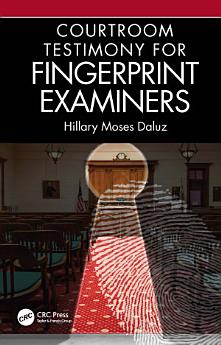Courtroom Testimony for Fingerprint Examiners
About this ebook
Courtroom Testimony for Fingerprint Examiners addresses all aspects of courtroom testimony as the first book to focus solely on testifying on fingerprint evidence as a comparative science. The book is presented in two parts. Section I addresses general expert witnessing for forensic scientists. This serves as a primer for the novice or a review for experienced witnesses covering such topics as the structure of the criminal justice system and federal rules of evidence, the role of the expert witness, testimony as teaching, presenting challenging scientific concepts to the layperson, court preparation, the three phases of expert witness testimony and landmark court decisions that have shaped the modern landscape of forensic testimony.
Section II focuses on specific issues affecting fingerprint examiners and how to field questions during both direct and cross-examination. While such "hot button" topics are absent from currently available texts, this section pays particular attention to these salient, emerging topics. This includes evidentiary challenges to fingerprint evidence, relevant publications such as the PCAST report, nomenclature and standards development, issues surrounding cognitive bias and subjectivity, probability models, error rates and cases of error and how to address issues of minimum point standards in both the empirical and holistic traditions. Both Section I and Section II provide examples and present innovations applicable to latent and tenprint examiners.
Features include:
- Presents a history of fingerprint evidence and current best practices and limits on characterizing fingerprint evidence in court, including appropriate nomenclature
- Provides current guidelines and recommendations for standards and the courtroom
- Illustrates how experts can work with attorneys so that the testimony process educates and informs jurors and judges rather than perpetuating an adversarial dynamic
- Addresses important issues such as cognitive bias, subjectivity, error rates, probability models and ethics
As a forensic training instructor for professionals – and previously as a college professor – author Hillary Moses Daluz has spent the past ten years teaching courtroom testimony courses to forensic scientists. Courtroom Testimony for Fingerprint Examiners offers an invaluable resource to forensic scientists, latent print examiners, tenprint examiners, lab personnel in related comparative fields, attorneys, investigative professionals and students enrolled in forensic science university programs.
About the author
Hillary Moses Daluz began her career at the Hayward Police Department in Hayward, CA as a Police Identification Specialist. After earning her Masters of Science degree in Forensic Sciences from the University of California, Davis she deployed to the Joint Expeditionary Forensic Facility at Camp Victory in Baghdad, Iraq as a Latent Print Examiner with Ideal Innovations. After returning stateside she became a member of the faculty in the Forensic Sciences program at Chaminade University of Honolulu, teaching at the undergraduate and graduate level. Daluz then accepted a management position as a Senior Latent Print Technician with American Systems in Washington, DC. She is currently an instructor for Tri Tech Forensics and a Forensic Specialist with Forensic Identification Services. Daluz is a Member on the Board of Directors for the International Association for Identification.
